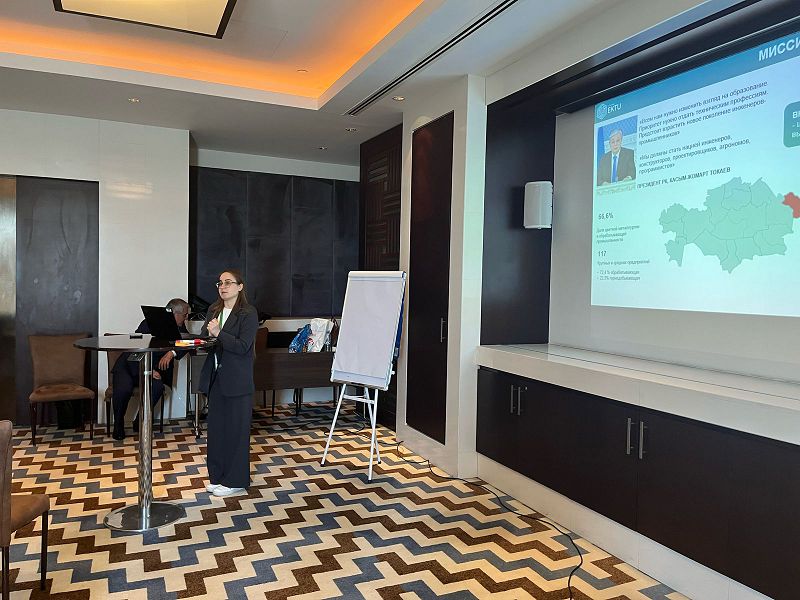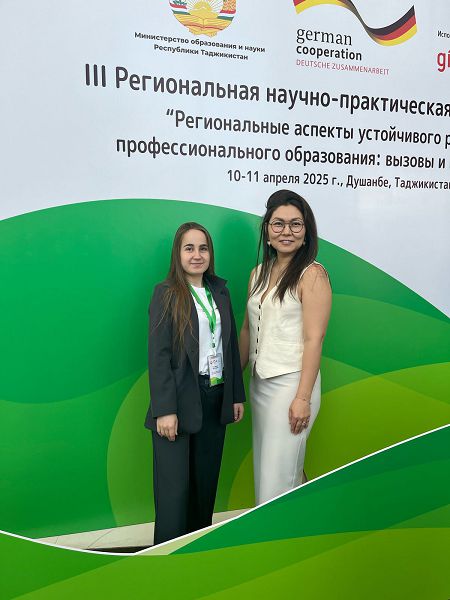2025 жылғы 10–11 сәуір күндері Д. Серікбаев атындағы Шығыс Қазақстан техникалық университетінің (ШҚТУ) өкілдері Душанбе қаласында өткен III Өңірлік ғылыми-практикалық конференцияға қатысты. Конференция «Кәсіптік білім берудің орнықты дамуының өңірлік аспектілері: сын-қатерлер мен перспективалар» тақырыбында ұйымдастырылып, Тәжікстан Республикасының Білім және ғылым министрлігі мен Халықаралық ынтымақтастық жөніндегі Герман қоғамының (Deutsche Gesellschaft für Internationale Zusammenarbeit — GIZ) қолдауымен PECA (Professional Education for Economic Growth Sectors in Central Asia — «Орталық Азиядағы экономикалық өсу секторларына арналған кәсіптік білім беру») бағдарламасы аясында өткізілді.
Конференцияның бірінші күні ШҚТУ делегациясы пленарлық отырыс пен кәсіптік білім беруді дамытудың халықаралық және ұлттық трендтеріне арналған секция жұмысына қатысты. Әсіресе, «жасыл экономика» мен орнықтылыққа баса назар аударылды. Қатысушылар Орталық Азия мен Еуропа елдерінің экологиялық құзыреттерді қалыптастыру, бизнестің қатысуымен кадр даярлау, білім беру үдерісін цифрландыру және жаһандық өзгерістер жағдайында университет басқару тәжірибелерімен танысты. ШҚТУ өкілдері ұсынылған шешімдерді Қазақстанда қолдану бойынша сұрақтар қойып, жаңа кәсіби байланыстар орнатты.
Конференцияның екінші күні ШҚТУ командасы конференцияның практикалық бөлігінде орталық іс-шаралардың біріне айналған екі шеберлік сабағын ұйымдастырып, жүргізді. Мастер-класстар тақырыбы – университеттік зерттеулерді индустрияға бағытталған қолданбалы шешімдерге трансформациялау. Олар PECA бағдарламасы аясында іске асырылып жатқан ШҚТУ мен Тәжік мемлекеттік коммерция университеті (ТМКУ) арасындағы тандемдік жобаның — «Университеттік зерттеулер арқылы инновацияларды ілгерілету: Тәжікстан мен Қазақстан арасындағы бірлескен бастама» — шеңберінде өткізілді.
Мастер-класстар үш өзара байланысқан мазмұндық блоктан тұрды. Бірінші бөлімде ШҚТУ-дың өңірлік зерттеу университеті ретіндегі рөлі таныстырылып, негізгі ғылыми жобалар, бизнес тапсырыстары бойынша келісімшарттық зерттеулер, өнеркәсіптік серіктестік тетіктері, дуальды білім беру, трансфер және құзыреттілік орталықтарын дамыту тәжірибелері ұсынылды. Сондай-ақ, Erasmus+, Дүниежүзілік банк сияқты халықаралық гранттық бағдарламаларға қатысу тәжірибесі баяндалды. Саламен тығыз байланыстағы PhD зерттеушілерді даярлау мысалдары және зерттеу нәтижелерін бизнес-ортаға енгізу тәсілдері ерекше қызығушылық тудырды.
Екінші бөлім тандемдік жобаның құрылымы мен мазмұнына арналды. Онда Тәжікстандағы тамақ өнеркәсібінің қажеттіліктері бойынша жүргізілген маркетингтік зерттеу нәтижелері, университеттік оқыту форматтарын бизнестің сұранысына бейімдеу жолдары және алдыңғы семинарлардан алынған қатысушылар пікірлері ұсынылды. Бұл бөлімде саладағы нақты проблемалардан тұрақты академиялық-индустриялық шешімдерге дейінгі жол айқын көрсетілді.
Үшінші бөлім интерактивті форматта өтті. Қатысушылар foresight-жоспарлау әдістемесіне негізделген WHY–WHAT–HOW моделін қолдана отырып, индустрияның өзекті мәселелерін талдап, болашақтағы қажеттіліктерін айқындап, Индустрия 4.0, орнықты өндіріс және циркулярлы экономика негізіндегі шешімдерді ұсынды. Жұмыс барысында 50-ден астам идеялар мен ұсыныстар жиналып, 2025–2050 жылдар аралығындағы уақыт көкжиегі мен тақырыптық кластерлерге бөлінді. Олар жаһандану, азық-түлік қауіпсіздігі, экологиялық қаптама, технологиялық трансформация және орнықты даму бағыттарын қамтыды.
Өткізілген шеберлік сабақтар университеттің тек білім мен ғылым көзі ғана емес, сонымен қатар индустрияны жаңғыртатын сенімді серіктес ретіндегі әлеуетін көрсетті. ШҚТУ ұсынған модельдер мен тәсілдер министрліктердің, оқу орындарының, жеке сектор мен халықаралық ұйымдардың өкілдері тарапынан жоғары бағаланды.
Іс-шара қорытындысы бойынша тандемдік жоба моделіне экономиканың өзге салаларында — ауыл шаруашылығы, логистика, құрылыс және экологиялық таза өнім өндірісі салаларында қолдану үшін қызығушылық білдірілді. ШҚТУ шеберлік сабақтары академиялық ғылымның нарық қажеттіліктеріне нақты жауап бере алатынын және орнықты даму жөніндегі халықаралық күн тәртібіне табысты ене алатынын дәлелдеді.



